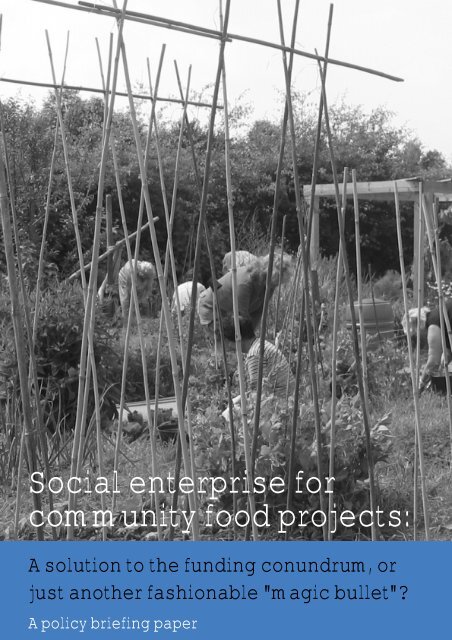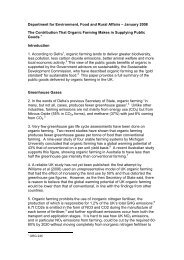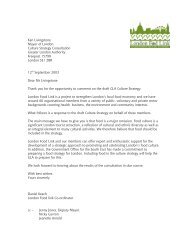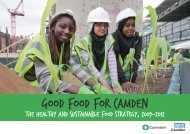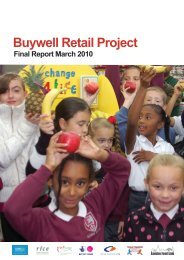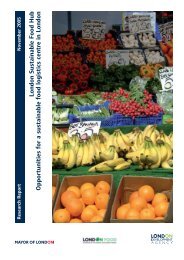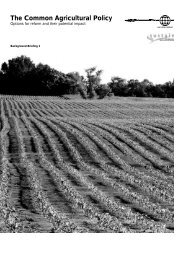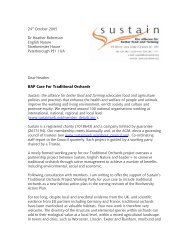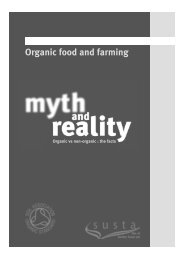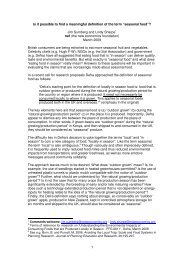Social enterprise for community food projects: - Sustain
Social enterprise for community food projects: - Sustain
Social enterprise for community food projects: - Sustain
Create successful ePaper yourself
Turn your PDF publications into a flip-book with our unique Google optimized e-Paper software.
<strong>Social</strong> <strong>enterprise</strong> <strong>for</strong><strong>community</strong> <strong>food</strong> <strong>projects</strong>:A solution to the funding conundrum, orjust another fashionable "magic bullet"?A policy briefing paper
IntroductionCommunity <strong>food</strong> <strong>projects</strong>, set up toaddress <strong>food</strong> access issues in some ofthe poorest communities across the UK,struggle from year to year to survive.They often lurch from one grant to thenext, with many <strong>projects</strong> disappearingas particular funding streams also comeand go. Precious time and ef<strong>for</strong>t fuelsthe task of fund-raising, at the expenseof valuable work supporting the mostvulnerable members of society inobtaining a healthy diet. These <strong>projects</strong>can be an essential component in thefight against diet-related disease andhealth inequalities, yet they are oftenthe first to suffer from reductions ingrant funding.This report draws on the responses of70 <strong>food</strong> <strong>projects</strong> contacted during theresearch. It considers how appropriateit is <strong>for</strong> these <strong>community</strong>-basedinitiatives to utilise social <strong>enterprise</strong>methods, and to what extent they arealready being taken up as an alternativeto complete dependence on grantfunding. The report also considers whathelp and advice can be offered tosupport and encourage thedevelopment of social <strong>enterprise</strong>s toaddress the problems of <strong>food</strong> poverty.'<strong>Social</strong> <strong>enterprise</strong> is a business withprimarily social objectives whosesurpluses are principally reinvested<strong>for</strong> that purpose in the business orin the <strong>community</strong>, rather than beingdriven by the need to maximiseprofits <strong>for</strong> shareholders and owners'<strong>Social</strong> Enterprise: A Strategy <strong>for</strong> Success,Department of Trade and Industry 2002The Food Poverty ProjectPeople on low incomes are more likely tosuffer and die from diet-related diseasessuch as cancer and coronary heart disease.This is partly due to inadequate physicaland economic access to the <strong>food</strong>s thatmake up a healthy diet - this phenomenonhas become known as <strong>food</strong> poverty. TheFood Poverty project works with a range oflocal, national and internationalorganisations to reduce these healthinequalities. It provides in<strong>for</strong>mation andsupport through a database, events and arange of publications. The project is alsoexploring new ways of working with lowincome communities to developappropriate policies to tackle <strong>food</strong> poverty.www.sustainweb.org/poverty_index.asp2
Background"<strong>Social</strong> <strong>enterprise</strong>" is a buzz-term <strong>for</strong> an old idea:using business methods <strong>for</strong> <strong>community</strong> good,rather than <strong>for</strong> the benefit of shareholders. <strong>Social</strong><strong>enterprise</strong>s are businesses with social objectives,charging <strong>for</strong> services and using surplus funds toreinvest in the business or in the <strong>community</strong>. Theycan be successful in bringing employment to, andimproving skills in disadvantaged communities, andhave the potential to become "a key component inthe process of modernising and re<strong>for</strong>ming ourpublic services". 1 To this end, the Government,along with various non-governmental organisations(NGOs), is committed to supporting thedevelopment of social <strong>enterprise</strong> through fundingand loan schemes, and generally advocating thedevelopment of the social economy as a vitalpartner to the private sector.However, whilst support <strong>for</strong> social <strong>enterprise</strong> is highon the government's agenda, support <strong>for</strong> <strong>community</strong><strong>food</strong> <strong>projects</strong> may be diminishing - with fundingoften precarious, short-term, and tied to varyinggrant provisions. The funding problem is partlybecause <strong>community</strong> <strong>food</strong> project are complexcreatures, so they often do not fit easily into thecategories defined by those institutions giving grants.Hard to define <strong>for</strong>mally, they encompass a range of<strong>food</strong>-related initiatives operating in a given<strong>community</strong>. They may include <strong>food</strong> buying co-ops,cookery clubs, <strong>community</strong> allotments, slimmingclubs, and <strong>community</strong> cafes. This research isprimarily concerned with <strong>projects</strong> that increase accessto healthy <strong>food</strong>s <strong>for</strong> those living on low incomes.Given the continuing difficulty <strong>community</strong> <strong>food</strong><strong>projects</strong> experience with obtaining grant funding,and the growing level of support <strong>for</strong> social<strong>enterprise</strong>, the Food Poverty Project wanted toinvestigate whether the time might be right <strong>for</strong>more <strong>community</strong> <strong>food</strong> <strong>projects</strong> to considerbecoming social <strong>enterprise</strong>s. In this way, theymight achieve at least partial, if not full, financialindependence from the endless fund-raisingtreadmill.Food poverty in the UKFood Poverty is now well documented, 2 and can bedefined as "the inability to acquire or consume anadequate or sufficient quantity of <strong>food</strong> in sociallyacceptable ways, or the uncertainty that one will beable to do so". 3 What this means in reality is that anindividual's ability to obtain a healthy diet can beconstrained by a variety of external factors: the costand availability of <strong>food</strong>, personal income, theproximity and location of shops and theiraccessibility, availability of public transport. Foodpreparation can be difficult if people lackappropriate skills or confidence, cooking facilities areinadequate or time is limited. Poor <strong>food</strong> choices canalso result from health problems, personalpreferences and, particularly in the case of children,clever advertising. 4The extent of <strong>food</strong> poverty in the UK is difficult toestimate. There has never been a comprehensivesurvey of nutrition and diet in low incomehouseholds. 5 However, large numbers of individualsacross the UK are vulnerable to experiencing <strong>food</strong>poverty, due to their poor economic situation. 6Various organisations 7 have undertaken extensiveresearch in this area and conclude that householdsthat live on a low income, whether from poor wagesor dependency on benefits, are unlikely to be able toaf<strong>for</strong>d a healthy balanced diet over a sustainedperiod. Such a situation is contributing to risinglevels of obesity, and to continued high rates ofpremature death from coronary heart disease (CHD),cancers and other diet-related diseases across the UK.Over the last ten years or so <strong>food</strong> poverty has beenrecognised as a public health issue worthy of aserious policy response, and Government hasacknowledged this in a range of strategies, plans andreviews. 8 The recent public health white paper andthe subsequent <strong>food</strong> and health action planhighlighted <strong>community</strong> <strong>food</strong> <strong>projects</strong> as amechanism <strong>for</strong> supporting and encouraging healthy<strong>food</strong> choices. However, many argue that such<strong>projects</strong> should be seen as only short-term solutionsthat should be set into a long-term framework ofpolicy options to remove the structural barrierswhich cause <strong>food</strong> poverty.3
The importance of <strong>community</strong> <strong>food</strong> <strong>projects</strong>4There is now almost universal agreement that<strong>community</strong> <strong>food</strong> <strong>projects</strong>, in principle, are a goodthing. They have been promoted as one of thesolutions to addressing <strong>food</strong> poverty and healthinequalities among a range of measures 9 put<strong>for</strong>ward by the government in various strategies andplans, the majority of which fall under the brief ofhealth agencies. However, the remit and potentialbenefits of <strong>community</strong> <strong>food</strong> <strong>projects</strong> are far widerthan just a contribution to improved health.The added value of <strong>community</strong> <strong>food</strong> <strong>projects</strong> isbroad - extending beyond the simple provision of ahealthy hot meal at a lunch club or a <strong>community</strong>café; or a supply of af<strong>for</strong>dable fresh fruit andvegetables at a <strong>food</strong> co-op; or learning how to cookat a friendly supportive cookery class. The <strong>projects</strong>can provide training and skills (thereby improvingemployability), build capacity within the <strong>community</strong>,and combat social exclusion, all of which affecthealth in the broadest sense. In other words theycan tick far more boxes than just 'better nutrition'.While diversity and an extended range of benefitscontribute to the importance of <strong>community</strong> <strong>food</strong><strong>projects</strong>, these strengths can also create potentiallimitations. Food <strong>projects</strong> often fall into no-man'sland - with no one department or agency takingresponsibility <strong>for</strong> their support and development.Many of the funding sources potentially availableto <strong>community</strong> <strong>food</strong> <strong>projects</strong> are restrictive. Forexample, funding available <strong>for</strong> coronary heartdisease (CHD) prevention will probably have onlyone acceptable indicator of success i.e. a reductionin CHD incidence. However, CHD reduction maybe only one of a large number of projectobjectives, and not one that can usually bedemonstrated within the lifetime of a project.No matter how successful <strong>community</strong> <strong>food</strong> <strong>projects</strong>are, many face constant frustration from having tochase a variety of funding sources that require achange of focus to suit a new pot of money everyyear, or having to provide a new element in orderto show innovation. More often than not fundingis only available <strong>for</strong> new <strong>projects</strong>, and <strong>for</strong> shortperiods of time, with core costs such as salariesand rent rarely covered as funders prefer to fundspecific <strong>projects</strong> leading to specific results.Consequently, much precious project time andef<strong>for</strong>t is concentrated on the activities of acquiringfunding, monitoring funding and showing howfunding has been spent.The question is, could that time and ef<strong>for</strong>t bebetter spent looking at other approaches togenerating income to support project activity?Wolverhampton Community FoodInitiative delivers fresh fruit andvegetables to low income communitiesacross the City with support from a BigLottery grant. However the current fundingis due to end in 2006 and project staff areexploring business plans <strong>for</strong> activities thatcould subsidise the project's <strong>community</strong><strong>food</strong> access work by generating incomethrough securing supply contracts withlocal hospitals and schools.Bath Place Community Venture,Leamington Spa, provides facilities,support and education <strong>for</strong> the local<strong>community</strong>, including a <strong>community</strong> café, afruit and veg co-op and a credit union.Despite a good track record spanning 30years, the centre has been under-funded<strong>for</strong> a number of years and, at time ofwriting, was facing a serious financial crisis.Perhaps a victim of its own success, BathPlace is finding it harder to obtain nationalfunding. Many funders want innovative<strong>projects</strong> rather than continue to fund toolder, less 'exciting' <strong>projects</strong>. Locally, BathPlace is competing with other health andregeneration <strong>projects</strong> receiving supportfrom local statutory agencies. The projectis now developing a business plan toexplore market-driven activities to generateessential core income.
The social <strong>enterprise</strong> agenda<strong>Social</strong> <strong>enterprise</strong>s are businesses that operate in the market providing services and goods, the surplus profit fromwhich is then re-invested to achieve social aims. Government is increasingly recognising the role social<strong>enterprise</strong> can play in the economy and how, with the right support, it can make an important contribution tothe regeneration and social well-being of many communities in the UK. Its three-year strategy 10 aims to tacklethe barriers to growth of the social <strong>enterprise</strong> sector. The strategy is a key element of the Government's policy ofredirecting public spending to address inequality and deprivation through the support and development ofsocial <strong>enterprise</strong>.A variety of organisations have the task of implementing the strategy, and new bodies such as the <strong>Social</strong>Enterprise Coalition and the <strong>Social</strong> Enterprise Unit within the DTI, have also been set up specifically. RegionalDevelopment Agencies (RDAs) have also been identified to take responsibility <strong>for</strong> certain areas and areexpected, as are local authorities, to have strategies to reflect this. Business Links are the national, mainstreamsupport service <strong>for</strong> small and medium sized <strong>enterprise</strong> and come within the remit of RDAs. However, much ofthis support is serviced by regional and local agencies sub-contracted to provide Business Links services. Thusthere is a multitude of national, regional and local statutory and non-statutory organisations and networksoffering a host of support services <strong>for</strong> actual and potential social <strong>enterprise</strong>s.In addition, various funding opportunities exist to develop the social <strong>enterprise</strong> sector. The Phoenix Fund wasset up in 1999 to encourage entrepreneurship in disadvantaged areas and has been widely used to supportsocial <strong>enterprise</strong>. The recently launched Futurebuilders programme is a £125m Home Office investment fundrun by a voluntary and <strong>community</strong> sector consortium which aims to increase the role of the voluntary and<strong>community</strong> sector in providing public services. There is also a range of commercial finance companies, banks,Community Development Finance Institutions, Trusts and Foundations that are increasingly supportive of social<strong>enterprise</strong> and offer loans, grants and investment opportunities.Finally, there is a range of strategies relevant to <strong>community</strong> <strong>food</strong> <strong>projects</strong> that can offer opportunities todevelop businesses, while at the same time complementing and supporting their social aims. The following areparticularly pertinent.Public procurementThe recent Treasury review of the voluntary and<strong>community</strong> sector's role in public sector services, 11and the Department <strong>for</strong> Environment, Food andRural Affairs Public Sector Food ProcurementInitiative, 12 both offer realistic opportunities <strong>for</strong> <strong>food</strong><strong>projects</strong> to diversify their activities into selling <strong>food</strong>services to public sector institutions to generateincome and supplement their core activities. Some<strong>projects</strong> are already working towards this.Many other <strong>food</strong> networks and <strong>projects</strong> areexploring the potential to generate income throughproviding public sector <strong>food</strong> contracts. Howeverthese <strong>projects</strong> are the exception, not the rule, andare often doing this despite a lack of support, adviceand practical guidance. For this potential to berealised the support and funding will have to bemade available throughout the regions not justallocated to those in regeneration zones, as iscurrently the case.RegenerationNeighbourhood Renewal clearly captures many <strong>food</strong>poverty issues within its remit with its emphasis onaddressing inequalities, increasing economicopportunities and encouraging employment andtraining. Support <strong>for</strong> social <strong>enterprise</strong> is a key part ofthis. Policy Action Team (PAT) 13 13 also produced arange of useful recommendations <strong>for</strong> improvingpeople's access to good quality shops.Un<strong>for</strong>tunately, since PAT 13's report was publishedin 1999, the initiative has been moved to theDepartment <strong>for</strong> Transport, Local Government andthe Regions (DTLR) and the recommendationsappear not to have been acted upon. 14So, against this background, can developing social<strong>enterprise</strong> activities provide an opportunity toaddress the long-term financial viability of<strong>community</strong> <strong>food</strong> <strong>projects</strong>?5
The researchAbout the studyThis report is based on the results of a questionnairesent, via a range of <strong>food</strong> and social <strong>enterprise</strong>networks and databases, to over 900 <strong>food</strong> <strong>projects</strong>and related organisations. Background research onsocial <strong>enterprise</strong> and related current policy wasundertaken through a combination of desk-basedresearch and phone interviews with policy makers,support agencies and organisations, and <strong>community</strong><strong>food</strong> <strong>projects</strong>. This included talking to a variety of<strong>food</strong> <strong>projects</strong> across England and Wales, ensuring ageographical spread and an urban/rural mix in orderto assess general attitudes to, and current use ofsocial <strong>enterprise</strong> methods.From the 900 questionnaires distributed, 70 werereturned (an 8% return rate). Responses werespread between rural, town, urban fringe, andinner city areas. Twenty-two respondents comefrom an inner city setting, 17 are based in towns,with the remaining 31 <strong>projects</strong> evenly mixedbetween rural areas and the urban fringe.Summary of the resultsOf those that answered the question (six did not), 26<strong>projects</strong> are run to some degree as social <strong>enterprise</strong>s,and 33 not at all. Five <strong>projects</strong> are not currently, butare planning to become social <strong>enterprise</strong>s.Projects serve a range of beneficiaries, most commonlyyoung people, mums/families, people with healthproblems, and people with learningdifficulties/disabilities. Those <strong>projects</strong> working tosupport people from deprived areas focus particularlyon ethnic groups, the homeless, and the unemployed.The majority of the <strong>projects</strong> class themselves asvoluntary sector bodies. However, a large number workas cross-sectoral partnerships. A small number are<strong>community</strong> co-ops or <strong>community</strong> businesses.Charity, company and partnerships are the mostcommon structures. Some are located within astatutory agency such as the Primary Care Trust.Although almost every project has at least one paidemployee, the majority rely on some volunteer support(some quite heavily). The majority of the responding<strong>projects</strong> have just a few employees; some have asmany as 30 volunteers.Of those <strong>projects</strong> operating as social <strong>enterprise</strong>s, 10generate less than 10% of their income though sellinggoods/services. Six respondents reported 10-25% oftheir income from trading activities, six reported 25-50%, and one reported more than 50%. (Three didnot respond to this question).In all cases money made through income-generation isstill supplemented by funding - mainly from trusts andstatutory agencies.Most <strong>projects</strong> operating in some capacity as social<strong>enterprise</strong>s are still at the planning/transitional stage.For these, income generating activities are mainlylimited to using existing facilities such as room hire.Projects set up specifically as social <strong>enterprise</strong>s generatethe highest proportion of their income through trading.Of those 26 <strong>projects</strong> operating as social <strong>enterprise</strong>s: 11received no advice, 11 had received advice, and fourdid not respond. The advice came from a variety ofsources: statutory business advice services, local andnational voluntary sector organisations, legal servicesagencies. Only two <strong>projects</strong> received advice from anorganisation with specific <strong>food</strong> expertise. Advice wasoften biased towards particular business models, andnot geared to support the needs of <strong>food</strong> <strong>projects</strong>.It was too early <strong>for</strong> half of the respondents to saywhether being a social <strong>enterprise</strong> was successful inproviding financial security. However, the other halfclearly felt the benefit both financially and culturally:it gives a sense of pride'it enables the project to focus on additional work'it is becoming successful- learning more as we go'For transitional <strong>projects</strong> the key barriers to success are:lack of skills within the existing staff and management,poor availability of start-up/transition funding, and alack of appropriate support and advice.Respondents identified the most useful support andadvice as: support via phone or drop-in on an ad hocbasis, project visits, low cost or free training, advice onfunding, advice on how to win contracts, how to workwithin a statutory sector framework with businessprinciples, staff development, and legal and structuralissues.LimitationsCommunity <strong>food</strong> <strong>projects</strong> that are more interestedin and/or know about social <strong>enterprise</strong> wereperhaps more likely to complete the questionnaireand so there<strong>for</strong>e the findings may show a slightbias towards social <strong>enterprise</strong>.6
Non-statutory agencies -the right kind of support?Wessex Reinvestment TrustIn 2001, following a report on obtainingfinance, produced by Sal<strong>for</strong>d University,organisations and agencies working in<strong>food</strong>, environment and social <strong>enterprise</strong> inthe southwest of England developed theWessex Reinvestment Trust. It aims tosupport the financial development of<strong>community</strong> business in the <strong>food</strong> andenvironment sector across the region. TheTrust was set up to help rural communitiesbecome more sustainable by facilitatingaccess to land, buildings, and financethrough giving loans and advice. It isgoverned by people from a large numberof different organisations, working in local<strong>food</strong> development, sustainable buildingand business, and social housing. WessexReinvestment Trust now works with localgovernment, banks, business links, theCountryside Agency and charitable trusts toprovide support to the sector.There are a number of non-statutory agenciessupporting the development of social <strong>enterprise</strong>s.National agencies tend to campaign <strong>for</strong> greatersupport <strong>for</strong> social <strong>enterprise</strong>s at policy level and/orare involved in running pilot <strong>projects</strong> to in<strong>for</strong>mpolicy. There are also networks that enable andfacilitate the sharing of experience and knowledgebetween members. However this support is onlyreally accessible to those <strong>projects</strong> already in thenetwork, and <strong>food</strong> <strong>projects</strong> starting to consider thesocial <strong>enterprise</strong> route may fall outside of this.In addition, many of the social <strong>enterprise</strong> networkorganisations have limited capacity to support andadvise non-member <strong>projects</strong> and organisations.This means <strong>projects</strong> at the beginning of theirexploration of different ways to generate incomehave limited access to these organisations. Thus, aswith statutory agencies, support <strong>for</strong> <strong>community</strong><strong>food</strong> <strong>projects</strong>, and particularly those that addresspoor <strong>food</strong> access, is limited and sporadic.The main objective <strong>for</strong> these organisations is topromote the development of social <strong>enterprise</strong> acrossall sectors, so expertise in <strong>community</strong> <strong>food</strong> <strong>projects</strong>is often determined by staff interests rather than acoherent policy. However this study found there arepockets of good structural approaches to supportand development work. Some regional and localsocial <strong>enterprise</strong> organisations are working inpartnership with local and regional <strong>food</strong> policyorganisations to develop a range of support servicesfocusing on the needs of <strong>community</strong> <strong>food</strong> <strong>projects</strong>.9
RecommendationsUnderstandably, statutory agencies seem to havedifficulties and limitations in coping with theneeds of <strong>community</strong> <strong>food</strong> <strong>projects</strong>. Localauthority structures vary widely, as does theircommitment to supporting the development ofsocial <strong>enterprise</strong>s. Government shouldthere<strong>for</strong>e consider whether other bodiescould be funded to offer social <strong>enterprise</strong>assistance to <strong>community</strong> <strong>food</strong> <strong>projects</strong>.Several national organisations already exist,including Food Links UK, the Foundation <strong>for</strong>Local Food Initiatives, the Soil Association and,of course, <strong>Sustain</strong>'s Food Poverty Project,alongside a host of regional and local <strong>food</strong>partnerships and networks. These organisationsare well placed to work in collaboration withexisting business support agencies to co-ordinatethe provision of specialist social <strong>enterprise</strong> adviceand guidance. With adequate funding theycould, <strong>for</strong> example:offer start-up funding <strong>for</strong> <strong>community</strong> <strong>food</strong><strong>projects</strong> interested in becoming social<strong>enterprise</strong>s,offer advice on how <strong>projects</strong> could tender<strong>for</strong> local public <strong>food</strong> procurement contracts,<strong>for</strong> example, <strong>for</strong> school meals or hospital<strong>food</strong>.Government needs to incorporate moreflexibility and autonomy into the servicecontracts of agencies such as Business Links andlocal authorities. This would allow theirsupport services to reflect better the localneeds of <strong>community</strong> <strong>food</strong> <strong>projects</strong>, andenable local agencies to take a liberalinterpretation of contracts and supportsmaller, less <strong>for</strong>mal initiatives.Public and private sector grant fundersshould develop funding policies that canaccommodate a range of differentfinancial models. Some funding regimesimpede the ability of social <strong>enterprise</strong>s to obtainfunding by, <strong>for</strong> example, prohibiting incomegenerating activities, or requiring equity.Non statutory network organisations specialisingin social <strong>enterprise</strong>, such as the <strong>Social</strong> EnterpriseCoalition and Co-operatives UK, could help toraise awareness amongst policy makers ofthe diverse benefits <strong>community</strong> <strong>food</strong><strong>projects</strong> can bring to the social economy.At the same time, the Food Poverty Project, andother similar networks, should bring to policymakers' attention the multiple benefits of thesocial <strong>enterprise</strong> approach to local <strong>food</strong>strategies.However, social <strong>enterprise</strong> methods are clearlynot an option <strong>for</strong> all <strong>community</strong> <strong>food</strong> <strong>projects</strong>.Government needs to acknowledge thatlong-term grants <strong>for</strong> some <strong>community</strong><strong>food</strong> <strong>projects</strong> will continue to be essential,and establish mechanisms <strong>for</strong> providingthis. While, innovation is important, so too isconsistency. This may mean that some <strong>projects</strong>cease to be <strong>projects</strong>, and are integrated intomainstream local authority or health services.For other <strong>projects</strong>, the element of independenceis vital to their success, so funding will need toremain at arms length. Either way, theprecariousness of short-term funding can be verydamaging to all the <strong>community</strong> membersinvolved in a project.10
ConclusionCommunity <strong>food</strong> <strong>projects</strong> are an important wayof tackling health inequalities and poor <strong>food</strong>access. They are often under funded, but areexpected to meet important government healthtargets, and have been identified as one of themain mechanisms <strong>for</strong> improving access to fruitand vegetables in Government's public healthstrategy. However, unless more funding isprovided to support this work, the currentapproach will almost certainly lead to more andmore <strong>community</strong> <strong>food</strong> <strong>projects</strong> chasing a static orshrinking amount of money.There is currently a great deal of hype aroundsocial <strong>enterprise</strong> as a means of addressing avariety of issues, including public sectorprocurement, social exclusion, regeneration andhealth inequalities. In theory social <strong>enterprise</strong>offers great potential <strong>for</strong> some <strong>community</strong> <strong>food</strong><strong>projects</strong>. From the snapshot provided by ourresearch, this potential is not yet being met - notby a long stretch.The social <strong>enterprise</strong> strategy objectives are clearand should go some way to tackle the barriers togrowth of the sector. However the necessarysupport services do not seem to be provided inany consistent way. If the government iscommitted to the development of social<strong>enterprise</strong>, per se, rather than (as some suspect)a means of providing public sector services onthe cheap, then substantial moves will have tobe made to develop appropriate supportstructures and mechanisms. Funding regimes willhave to adapt to accommodate the needs of<strong>food</strong> <strong>projects</strong> in transition, and the current lackof understanding and awareness, at policy level,of the status and needs of <strong>community</strong> <strong>food</strong><strong>projects</strong> will have to be addressed.References1 Patricia Hewitt, quoted in <strong>Social</strong> Enterprise: A strategy<strong>for</strong> success, Department of Trade and Industry, 20022 See Dowler, E. (2001) Poverty Bites. London: ChildPoverty Action Group; Leather, S. (1996) Making ofmodern malnutrition: An overview of <strong>food</strong> poverty inthe UK. London: The Caroline Walker Trust; Watson, A.(2002) Hunger from the Inside: the experience of <strong>food</strong>poverty in the UK. <strong>Sustain</strong>, London; Hitchman, C. et al.(2002) Inconvenience <strong>food</strong>: The struggle to eat well ona low income. London: Demos.3 Riches, G. (1996) Hunger, <strong>food</strong> security and welfarepolicies: Issues and debates in first world societies,paper presented to Nutrition Society Summer Meeting,June 1996.4 Watson, A. (2002) Hunger from the Inside: theexperience of <strong>food</strong> poverty in the UK. <strong>Sustain</strong>, London.5 The Food Standards Agency is funding a dietary surveyof low income groups. Results are due in 2006. Checkwww.<strong>food</strong>.gov.uk <strong>for</strong> updates.6 Research by the Joseph Rowntree Foundation estimatesthat around 4 million people in Britain are not properlyfed by today's standards, Gordon, D. et al. (2000)Poverty and social exclusion in Britain, Joseph RowntreeFoundation.7 Child Poverty Action Group (www.cpag.org.uk), FamilyBudget Unit (www.york.ac.uk/res/fbu/), FoodCommission (www.<strong>food</strong>comm.org.uk), MaternityAlliance (www.maternityalliance.org.uk).8 See Acheson, D. (1998) Inequalities in Health Report,HMSO; SEU (2000) Neighbourhood Renewal StrategyPolicy Action Team 13 Report on Shopping Access <strong>for</strong>People in Deprived Areas; Department of Health (1999)Saving lives: Our Healthier Nation, TSO; Department ofHealth (2000) The NHS Plan: A plan <strong>for</strong> investment, aplan <strong>for</strong> re<strong>for</strong>m. London: TSO; Department of Health(2004) Choosing Health: Making healthy choices easier;Department of Health (2005) Choosing a Better Diet: a<strong>food</strong> and health action plan.9 For example, the School Fruit and Vegetable Scheme,National Five a Day Programme, re<strong>for</strong>m of the WelfareFood Scheme (Healthy Start), and the Food in Schoolsprogramme. See www.dh.gov.uk <strong>for</strong> more details.10 Department of Trade and Industry (2002), <strong>Social</strong>Enterprise: A strategy <strong>for</strong> success.11 HM Treasury (2002), The Role of the Voluntary andCommunity Sector in Service Delivery: A Cross CuttingReview, TSO, London.12 For more in<strong>for</strong>mation about DEFRA's Public Sector FoodProcurement Initiative (launched 2003) seewww.defra.gov.uk/farm/sustain/procurement/index.htm13 Department of Health (1999) Improving shoppingaccess <strong>for</strong> people living in deprived neighbourhoods.Report of Policy Action Team 13 of the <strong>Social</strong> ExclusionUnit. London: Department of Health <strong>for</strong> the CabinetOffice.14 Lang,T., Sharpe, R. and Caraher, M. (2002) Food, accessto shops and transport: What movement since PAT13?A report to the <strong>Social</strong> Exclusion Unit.11
AcknowledgmentsThank you to all those people that gave their time and expertise <strong>for</strong> this research project,particular thanks to:Ann Baldridge (Food Matters)Pag Biggs (Southville Centre)Fay Blair (Global to Local)Maresa Bossano (Hastings Five A Day)Sue Chant (Taunton Deane PCT)Richard Clark (Bath Place Community Café)Sarah Davies (East Sussex Food and HealthPartnership)Clare Devereux (Food Matters)Gavin Dupee (<strong>Sustain</strong>)Rhian Evans (Hartcliffe Health and EnvironmentAction Group)Steve Garrett (Riverside Community MarketAssociation)Bernie Gill (Teams Catering)Lucy Gillie (Scottish Community Diet Project)James Gurney (Wolverhampton Community FoodInitiative)Wendy Harris (Hartcliffe Health and EnvironmentAction Group)Colin Harvard (Sharrow Community Forum)Anne Hobbiss (Brad<strong>for</strong>d Food Partnership)Sarah Jackson (Yeovil Health OpportunitiesProgramme)Jilla Jamfar (<strong>Social</strong> Enterprise London)Bill Kirkup (North East Land Links)Jeanette Longfield (<strong>Sustain</strong>)Simon McCabe (North East Land Links)Ken Moon (Riverside Community MarketAssociation)Mahua Nandi (<strong>Social</strong> Enterprise Coalition)Jonathan Pauling (Newham Food Access Partnership)Greg Pilley (Soil Association)Wilf Richards (Permascape)Eric Samuel (Community Food Enterprise)Paul Sander-Jackson (Somerset Food Links)Lindy Sharpe (City University)Lisa Sanfilippo (New Economics Foundation)Sue Walker (Hartcliffe Health and EnvironmentAction Group)Courtney Van de Weyer (<strong>Sustain</strong>)Many thanks to North East Land Link, and Hartcliffe Health and Environment Action Group <strong>for</strong> the pictures.All errors and omissions are entirely those of the author.This work has been undertaken <strong>for</strong> <strong>Sustain</strong>'s Food Poverty Project by Victoria Williams from Food Matters,with a grant from Lloyds TSB Foundation.Food Matters Partnership Ltd is a not <strong>for</strong> profit companysupporting individuals and organisations working towards moresustainable, equitable <strong>food</strong> systems. www.<strong>food</strong>matters.orgFurther in<strong>for</strong>mationThis policy paper <strong>for</strong>ms part of a larger project which includes a web based tool-kit to assist<strong>community</strong> <strong>food</strong> <strong>projects</strong> in adopting social <strong>enterprise</strong> methods. For further in<strong>for</strong>mation visitwww.sauce-toolkit.org<strong>Sustain</strong>: the alliance <strong>for</strong> better <strong>food</strong> and farming94 White Lion Street, London N1 9PFTel: 020 7837 1228 Fax: 020 7837 1141E-mail: sustain@sustainweb.orgWeb: www.sustainweb.orgsustainthe alliance <strong>for</strong>better <strong>food</strong> and farmingThe research has been made possible through a grant from the Lloyds TSB Foundation.


